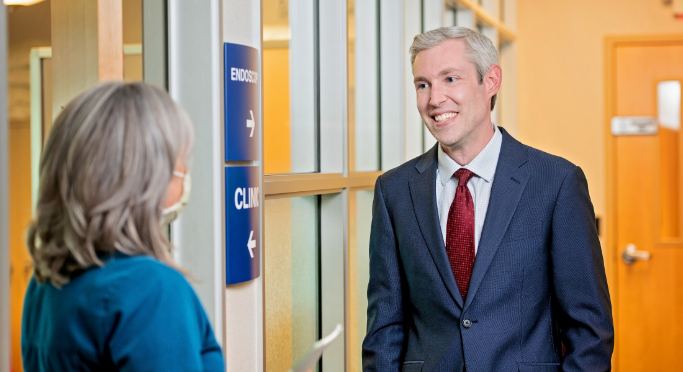What is Diverticular Disease/Diverticulitis?
Diverticular disease is an umbrella term to describe the conditions known as diverticulitis and diverticulosis. In both conditions, diverticula are present, or small pouches that can form in the lining of the digestive tract. Diverticula can range in size and can form anywhere in the inner lining of the colon.
The main differences between diverticulosis and diverticulitis are:
Diverticulosis
This simply describes the presence of diverticula in the colon. They may not cause any symptoms or need to be treated; however, this condition can lead to diverticulitis.
Diverticulitis
Occurs when one or more diverticula becomes inflamed or infected. Symptoms may include severe abdominal pain, nausea, fever and changes in bowel habits.
You may be at an increased risk of developing diverticular disease or diverticulitis if you are over 40 years old, are male, eat a low fiber diet, are overweight, are a smoker or take nonsteroidal anti-inflammatory drugs (NSAIDs) regularly.
How is Diverticular Disease/Diverticulitis Diagnosed?
Diverticula are believed to be caused when constipation puts strain on the colon walls, leading to the formation of these pockets in weak areas of the colon. Diverticulitis occurs when these diverticula tear, leading to inflammation and sometimes infection.
Because some people with diverticulosis may not have any symptoms, diverticular disease is often found through other tests that are performed for unrelated health reasons. However, if you are experiencing symptoms associated with diverticulitis, be sure to let your doctor know, as he or she may recommend some testing. Tests may include blood tests, stool samples, a colonoscopy or more for a proper diagnosis.
Treatment Options for Diverticulitis
Treatment for diverticulitis will depend on the severity of symptoms. For mild symptoms, treatment may include antibiotics to treat infection, as well as a liquid diet for a while to allow your bowels to heal. For more severe cases of diverticulitis, hospitalization may be required. In the hospital, you may receive intravenous fluids and be considered for surgery.
Surgery may be required for diverticulitis to treat the following:
Abscesses: If abscesses, or contained infections, occur in the abdomen, surgery may be required to remove them.
Tears in the Colon: Tears or perforations in the colon can allow stool or pus to leak into the abdominal cavity. This can lead to peritonitis, a very serious infection that requires emergency surgery.
Blockages or Strictures: Past infections in the colon can lead to scar tissue formation, which may partially or completely block a section of the colon. If this occurs, surgery will be needed to remove these blockages.
Fistulas: A fistula is an abnormal connection between two organs that should not connect. A fistula located in the colon can connect to the bladder, vagina, uterus or other parts of the colon. Surgery is needed to close these unnecessary connections.
Diverticular Bleeding: This occurs when a small blood vessel that is located near a diverticula ruptures. In some cases, bleeding stops on its own. However, if bleeding does not stop, surgery may be required.
Your South Denver GI Team
At South Denver GI, our team of physicians and advanced practice providers have the expertise to provide you with outstanding care. If you would like to learn more about Diverticular Disease/Diverticulitis or need to schedule an appointment at our office, contact us today!
View All Our Providers
Contact Us Today
For more information regarding diverticular Disease or diverticulitis, please contact South Denver GI today. Your first step toward treatment is to schedule an appointment with one of our experienced providers.
Contact UsRequest Appointment
Click on the Schedule Appointment button to schedule an appointment with your South Denver GI provider online. If you do not wish to use our convenient online scheduling tool, please fill out the form below and our team will contact you shortly.







